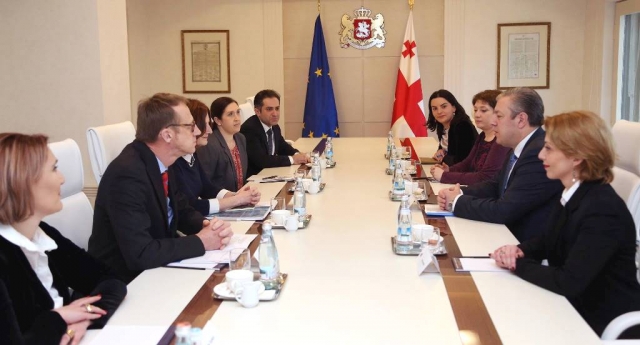Georgia’s Kvirikashvili Meets International Expert of Human Rights
TBILISI – Georgian Prime Minister, Giorgi Kvirikashvili met the human rights international expert Maggie Nicholson, who is the author of the report about Georgia's National Human Rights Strategy for 2014-2020.
The report on the progress of implementation of the National Strategy for the Protection of Human Rights in Georgia (2014-2020) incorporates the findings of the expert’s assessment visit in Georgia carried out between October 29 – November 7, 2016, during which Maggie Nicholson met with various stakeholders.
The PM thanked the international expert for her study that duly recognizes the country's progress and pointed out the Georgian Government's commitment to continuing reforms to strengthen respect for human rights, democratic development, and rule of law.
Kvirikashvili underlined that the implementation of the National Human Rights Strategy and Action Plan is one of the priorities of the Government of Georgia, adding the recent reforms aim strengthening the judiciary, freedom of speech and expression, property rights, the penitentiary system, media pluralism, fair elections, business freedom, and principles of antidiscrimination.
Maggie Nicholson's report on the implementation of Georgia's National Human Rights Strategy for 2014-2010 was supported by UNDP and "Promoting Rule of Law in Georgia", a program implemented by the USAID-financed East-West Management Institute.
How successful is Georgia in implementing its Human Rights Strategy 2014 - 2020? Findings and recommendations of an independent report were presented on April 10, 2017, to the representatives of the Georgian Government, Parliament, civil society and international organizations.
The report welcomes the significant progress made, to greater and lesser degrees, in almost all subject areas addressed in the National Strategy. In addition to general recommendations, the report makes specific recommendations in relation to justice, penitentiary systems and the prevention of torture and ill-treatment, the right to privacy, freedom of expression, assembly and demonstration, minority rights, rights of the child, persons with disabilities, internally displaced persons, migrants, gender equality and right to work. It goes on to identify priorities for further action.
Thea Morrison












